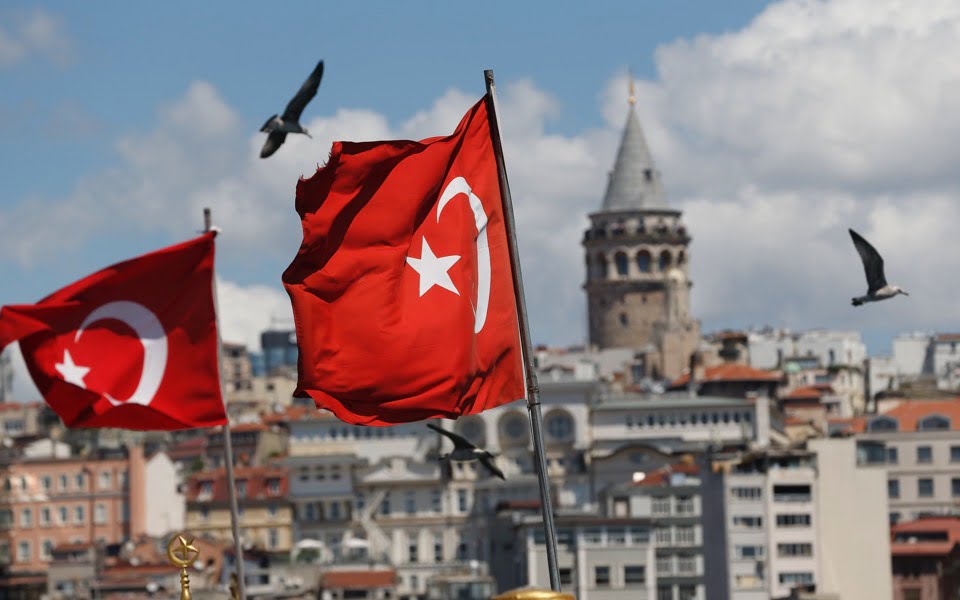HANS-LUKAS KIESER: ‘Great Turkey’ is a ‘poisonous chimera’

In interview with Kathimerini, the respected historian warns revisionists against challenging Lausanne Treaty
Hans-Lukas Kieser teaches Ottoman and modern history at the universities of Zurich in his native Switzerland and Newcastle in Australia, and is widely regarded as one of the foremost authorities on modern Turkey. He has studied the Lausanne Treaty at great depth and has a book coming out soon on the subject, and is also the author of “Talaat Pasha: Father of Modern Turkey, Architect of Genocide,” which was published in 2017 by Princeton University.
 In the last five years the 1923 Lausanne Treaty has been publicly challenged by Turkish President Recep Tayyip Erdogan. However, Greece and Western powers have showed no appetite to renegotiate it and consider it the bedrock of their relations with the Turkish Republic. Do you think that an open challenge of the treaty, through the use of force, might be a critical part of Erdogan’s effort to get re-elected in 2023?
In the last five years the 1923 Lausanne Treaty has been publicly challenged by Turkish President Recep Tayyip Erdogan. However, Greece and Western powers have showed no appetite to renegotiate it and consider it the bedrock of their relations with the Turkish Republic. Do you think that an open challenge of the treaty, through the use of force, might be a critical part of Erdogan’s effort to get re-elected in 2023?
Erdogan’s challenge of the Lausanne Treaty goes back much farther and has to do with his Turkish-Islamist roots. He held in high honor the author of an influential book against the Lausanne Treaty who took most of his arguments from the memoirs of Riza Nur, Ankara’s vice-plenipotentiary in Lausanne. Nur later fell out with Ataturk.
For more context, let us first shortly focus on the early 1920s and the formation of the Republic of Turkey, for which the Lausanne Treaty is considered the international “birth certificate.”
Under the banner of nationalism, the Ankara-based republic emerged from a warring Muslim community of interest. In its war for exclusionary rule in Anatolia, it was critically supported by the Bolsheviks. Before this war, the dictatorial Young Turks party-state, which ruled the Ottoman Empire, had lost WWI. Most cadres in Ankara were former Young Turks, many of them leadingly involved in genocide during WWI.
From its beginning, the polity formed by Ankara’s National Assembly has done without a democratic social contract, and without wanting real democracy. Turkish-Muslim identity and loyalty to Ankara’s rule were paramount. A democratic contract would have been codified in a consensual, broad-based constitution.
Sure enough, without a robust constitutional foundation, nationalistic politics lacked a compass. They therefore repeatedly drifted off into crises, authoritarianism and economic near-collapses. The republic has never come to rest peacefully within itself.
In the 1920s, the state benefited from a huge amount of so-called “abandoned (Christian) property” that Lausanne-based Western diplomacy left to Ankara. After the Second World War, Western states and institutions came to the rescue of the strategic partner in its repeated financial crises. Already during and for decades after the Lausanne Conference, Turkey remained plagued by coercion and violence. An almost permanent state of emergency reigned in parts of the country.
Even so, nevertheless, the Lausanne Treaty pretty much ensured peace with the neighbors during the 20th century.
This openly changed with Erdogan and his ruling alliance in Ankara since 2016. Islamists and ultranationalists have for long regretted, and therefore aimed at, a maximalist implementation of the so-called National Pact (Misak-i Milli). They wanted Ankara’s unitary rule in the whole of Asia Minor plus in parts of its neighborhood.
In this vein, Erdogan has been embracing an active revision of the “Lausanne borders” by war and invasion since 2016. The Lausanne Conference had endorsed the National Pact in a moderate version, by way of compromises notably on Mosul, Northern Syria and the Aegean islands. Although proud of his achievements in Lausanne, Nur sympathized with the maximalists.
‘Lacking true democratic credentials and a peaceful strategic compass, a populist autocracy seeks salvation in repression, aggression and expansion of Turkish-Islamist influence’
Therefore, the impending 2023 election is not the reason, but the catalyst of possibly accelerated forceful revision, at least rhetorically. This, of course, together with important other factors like poor poll ratings, astronomic inflation, and a decline of public faith.
The political picture is straightforward: Lacking true democratic credentials and a peaceful strategic compass, a populist autocracy seeks salvation in repression, aggression and expansion of Turkish-Islamist influence.
Revision also targets the South Caucasus including Armenia. In contrast to the Treaty of Paris-Sevres in 1920, replaced by Lausanne in 1923, this region had no longer been on the main agenda in Lausanne. The Bolsheviks and the Kemalists had already divided it among themselves by 1921. Left without the USA, the League of Nations lacked potent partners willing to intervene in a timely manner in favor of League-supported Armenia.
The Armenians have remained the Turkish nationalists’ favorite foe and bogeyman even before the Greeks. Compared to these, they are much more vulnerable. Stirring up and exploiting nationalist emotions still politically pays in Turkey as much as it did during the 20th century.
Do you see Turkey’s revisionist behavior as a by-product of the Erdogan era that is destined to disappear after his eventual departure from politics or is Turkey a classic example of a rising power demanding the renegotiation of its relationships with neighbors and seeking a new role in the regional and global balance of power regardless of its leader?
I see Turkey’s revisionist and expansionist behavior less as a quasi-logical quest for a new role in a changing world – what it partly certainly is – than as a dangerous substitute.
There has emerged once more the persistent, but poisonous chimera of “Great Turkey.” Like during the crises after the constitutional Young Turk revolution of 1908, this chimera has again substituted what are the true tasks and challenges. Put shortly, it would be about taking the demanding road toward democracy, domestic peace, and democratization in the Middle East.
By the mid-2010s, Ankara had definitively missed this vocation. Its autocratic populism has given space to the temptations of Islamism and far-right nationalism – with disastrous consequences domestically and abroad. We see an unhealthy – i.e. compensatory – undemocratic nationalism also among the opposition parties. In final analysis, this is due to how the Lausanne Conference had endorsed Ankara’s rule – i.e. with blatantly anti-democratic birth defects, including a fatal disregard for minorities and impunity for crimes against humanity. Major parts of the current opposition parties have not only failed to efficiently oppose the regime’s repression and belligerent policies, but they have largely rallied behind its nationalist warmongering and its anti-Kurdish – and, since 2020, anti-Armenian – hate propaganda.
There are wise and courageous exceptions, most importantly those belonging to the HDP, a few also from within the CHP and minor parties, or voiced by outstanding and persecuted individuals like Osman Kavala.
Do you think that the strengthening of the USA’s strategic presence in Greece pushes Turkey to the sidelines and diminishes its strategic importance for NATO, hence forcing Turkey to choose between being relegated by the West as a pariah state or realigning itself with the Alliance?
Russia, Turkey and Iran are currently the strongest anti-democracies in Europe’s neighborhood. Unfortunately, NATO has hitherto contributed little or nothing to real democracy except in Eastern Europe. For Turkey, the crucial question is not only to possibly realign with the NATO Alliance, but above all the embrace or open rejection of democratic values themselves.
This has been Turkey’s “Gretchenfrage” since late-Ottoman times. It is of course related to the question where does Turkey want to belong. Rejection does not automatically mean becoming a “pariah state,” as we see in the West’s dealings with Saudi Arabia and other autocratic Gulf monarchies.
Globally, we currently see more clearly than perhaps ever the polarization between democratic and anti-democratic forces. The war in Ukraine has opened the eyes of many people and politicians to this cleavage, and the necessity to take a stand. Nancy Pelosi, the speaker of the US House of Representatives, has made this issue crystal-clear during her recent speeches in Yerevan and Taiwan. Democratic-minded people must contribute to a rediscovering of democracy and a new learning of how to own democracy domestically and in the relation with other countries. Besides strategic decisions, this includes all aspects of social justice.
The disillusioned European view of Putin’s Russia, the US and Israeli shift from Turkey to Greece and Cyprus, as well as the continued Western support for the Kurdish-based democratic forces in Syria are among many signs of this recent learning process.
Given that Western powers actively discourage expansionist Turkey’s ambitions in the Aegean and Cyprus, what are the possibilities of Turkey trying to accommodate itself with Western consensus and what are the possibilities of Turkey getting actively engaged in conflict? In other words, with Biden in Washington and Macron in Paris, could Erdogan have any chance if he proceeds in openly challenging the status quo in the Eastern Mediterranean?
Ankara’s martial rhetoric and creation of tension is largely for domestic consumption in the crisis-ridden country. In this regard, NATO and the EU have long allowed themselves to be danced around on the nose by the Turkish president.
The flight forward, into war, is however always a real risk with an incalculable autocrat who politically stands with his back to the wall. The AKP-MHP regime in Ankara has hitherto limited its armed aggressions abroad to places where it had to do with clearly weaker and worse-armed adversaries. These were the Kurds in Syria and Iraq or – hand in hand with Baku – the Armenians, who are lukewarmly supported, at most, by Putin. Also, Erdogan had greatly benefited from President Trump’s irresponsible weakness for him until 2020.
Presently, there is no realistic chance of Turkish forces getting successfully engaged in an armed conflict against Greece. As you allude to, the leadership in Washington, Paris and other democratic capitals would not hesitate to support the side that is facing aggression and on alert.
Sure enough, there is justified need for reasonable communication and negotiation between adults on many questions regarding the Eastern Mediterranean – from patching things up in Cyprus and the security of the Greek islands to migration, ecology, and fair shares in exploiting resources and pipelines.
If revisionist dreamers of Great Turkey start to question the Lausanne boundaries, they are one-eyed. They open a Pandora’s box that turns against themselves. The reopened box contains Lausanne’s suppressed Kurdish, Armenian and Rum issues. This would question the foundation and legitimacy of the Turkish Republic itself as defined by Lausanne. The dreamers overestimate their potential; they recreate too well-known crises. It is true that crises are the atmosphere required for the survival of Ankara’s volatile political style.
On every side, it is time to meet the real post-Lausanne challenges of the region. Democracy in its full sense is the all-decisive criterium for lasting progress. It includes rule of law, freedom of expression, social solidarity, and the fundamental recognition of “the others” within and beyond national borders. Is Turkey ready for a radical turn and return to democracy? Turned to Asia, she will be unhappier than she has already become, if she continues without renewing her ties to Europe. She needs to radically resume where she lost track after promising steps in the early 2000s.

 Ακολουθήστε το
Ακολουθήστε το